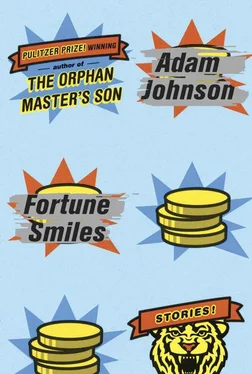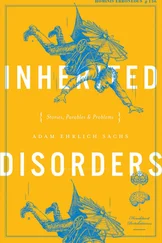For the first time, the president falls silent.
I ask, “Do you know that you’re gone…that you’ve died?”
The president doesn’t hesitate. “The end of life is another kind of freedom,” he says.
The assassination flashes in my eyes. I’ve seen the video so many times — the motorcade slowly crawls along while the president, on foot, parades past the barricaded crowds. Someone in the throng catches the president’s eye. The president turns, lifts a hand in greeting. Then a bullet strikes him in the abdomen. The impact bends him forward, his eyes lift to confront the shooter. A look of recognition settles into the president’s gaze — of a particular person, of some kind of truth, of something he has foreseen? He takes the second shot in the face. You can see the switch go off — his limbs give and he’s down. They put him on a machine for a few days, but the end had already come.
I glance at Charlotte, asleep. “Mr. President,” I whisper, “did you and the first lady ever talk about the future, about worst-case scenarios?”
I wonder if the first lady was the one to turn off the machine.
The president smiles. “The first lady and I have a wonderful relationship. We share everything.”
“But were there instructions? Did you two make a plan?”
His voice lowers, becomes sonorous. “Are you asking about bonds of matrimony?”
“I suppose so,” I say.
“In this regard,” he says, “our only duty is to be of service in any way we can.”
My mind ponders the ways in which I might have to be of service to Charlotte.
The president then looks into the distance, as if a flag is waving there.
“I’m the president of the United States,” he says, “and I approved this message.”
That’s when I know our conversation is over. When I reach to turn off the iProjector, the president looks me squarely in the eye, a coincidence of perspective, I guess. We regard each other, his eyes deep and melancholy, and my finger hesitates at the switch.
“Seek your inner resolve,” he tells me.
—
Can you tell a story that doesn’t begin, it’s just suddenly happening? The woman you love gets the flu. Her fingers tingle, her legs go rubbery. Soon she can’t grip a coffee cup. What finally gets her to the hospital is the need to pee. She’s dying to pee, but the paralysis has begun: the bladder can no longer hear the brain. After an ER doc inserts a Foley catheter, you learn new words— axon, areflexia, ascending peripheral polyneuropathy.
Charlotte says she’s filled with “noise.” Inside her is a “storm.”
The doctor has a big needle. He tells Charlotte to get on the gurney. Charlotte is scared to get on the gurney. She’s scared she won’t ever get up again. “Please, honey,” you say. “Get on the gurney.” Soon you behold the glycerin glow of your wife’s spinal fluid. And she’s right. She doesn’t get up again.
Next comes plasmapheresis, then high-dose immunoglobulin therapy.
The doctors mention, casually, the word ventilator .
Charlotte’s mother arrives. She brings her cello. She’s an expert on the siege of Leningrad. She has written a book on the topic. When Charlotte’s coma is induced, her mother fills the neuro ward with the saddest sounds ever conceived. For days, there is nothing but the swish of vent baffles, the trill of vital monitors, and Shostakovich, Shostakovich, Shostakovich.
Two months of physical therapy in Santa Clara. Here are dunk tanks, sonar stimulators, exoskeletal treadmills. Charlotte becomes the person in the room who makes the victims of other afflictions feel better about their fate. She does not make progress, she’s not a “soldier” or a “champ” or a “trouper.”
Charlotte convinces herself that I will leave her for one of the nurses in the rehab ward. She screams at me to get a vasectomy so this nurse and I will suffer a barren future. To soothe her, I read aloud Joseph Heller’s memoir about contracting Guillain-Barré syndrome. The book was supposed to make us feel better. Instead, it chronicles how great Heller’s friends are, how high Heller’s spirits are, how Heller leaves his wife to marry the beautiful nurse who tends to him. And for Charlotte, the book’s ending is particularly painful: Joseph Heller gets better.
We tumble into a well of despair that’s narrow and deep, a place that seals us off. Everything is in the well with us — careers, goals, travel, children — so close that we can drown them to save ourselves.
Finally, discharge. Yet home is unexpectedly surreal. Amid familiar surroundings, the impossibility of normal life is amplified. But the cat is happy, so happy to have Charlotte home that it spends an entire night curled on Charlotte’s throat, on her tracheal incision. Goodbye, cat! While I’m in the garage, Charlotte watches a spider slowly descend from the ceiling on a single thread. She tries to blow it away. She blows and blows, but the spider disappears into her hair.
Still to be described are tests, tantrums and treatments. To come are the discoveries of Kurt Cobain and marijuana. Of these times, there is only one moment I must relate. It was a normal night. I was beside Charlotte in the mechanical bed, holding up her magazine.
She said, “You don’t know how bad I want to get out of this bed.”
Her voice was quiet, uninflected. She’d said similar things a thousand times.
“I’d do anything to escape,” she said.
I flipped the page and laughed at a picture whose caption read, “Stars are just like us!”
“But I could never do that to you,” she said.
“Do what?” I asked.
“Nothing.”
“What are you talking about, what’s going through your head?”
I turned to look at her. She was inches away.
“Except for how it would hurt you,” she said, “I would get away.”
“Get away where?”
“From here.”
Neither of us had spoken of the promise since the night it was exacted. I’d tried to pretend the promise didn’t exist, but it existed.
“Face it, you’re stuck with me,” I said, forcing a smile. “We’re destined, we’re fated to be together. And soon you’ll be better, things will be normal again.”
“My entire life is this pillow.”
“That’s not true. You’ve got your friends and family. And you’ve got technology. The whole world is at your fingertips.”
By friends, I meant her nurses and physical therapists. By family, I meant her distant and brooding mother. It didn’t matter: Charlotte was too disengaged to even point out her nonfunctional fingers and their nonfeeling tips.
She rolled her head to the side and stared at the safety rail.
“It’s okay,” she said. “I would never do that to you.”
—
In the morning, before the nurses arrive, I open the curtains and study the drone in the early light. Most of the stealth and propulsion parts are off the shelf, but the processors are new to me, half hidden by a Kevlar shield. To get the drone to talk, to get some forensics on who sent it my way, I’ll have to get my hands on the hash reader from work.
When Charlotte wakes, I prop her head and massage her legs. It’s our morning routine.
“Let’s generate those Schwann cells,” I tell her toes. “It’s time for Charlotte’s body to start producing some myelin membranes.”
“Look who’s Mr. Brightside,” she says. “You must have been talking to the president. Isn’t that why you talk to him, to get all inspired? To see the silver lining?”
I rub her Achilles tendon. Last week Charlotte failed a big test, the DTRE, which measures deep tendon response and signals the beginning of recovery. “Don’t worry,” the doctor told us. “I know of another patient who also took nine months to respond, and he managed a full recovery.” I asked if we could contact this patient, to know what he went through, to help us see what’s ahead. The doctor informed us this patient was attended to in France, in the year 1918.
Читать дальше












